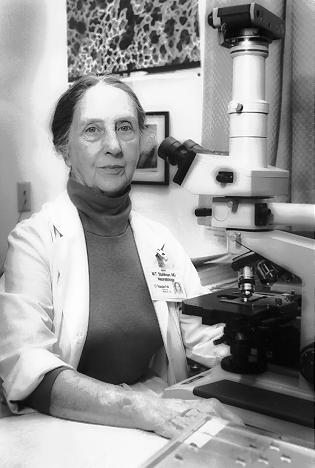
Dr. Mildred Stahlman
Future challenges facing perinatologists subject of national conference
Perinatologists face a number of important medical and social challenges as the field of neonatology approaches the 21st century.
"Some are simple. Some are extraordinarily complex. But all are very important," said Dr. Mildred T. Stahlman, professor of Pediatrics and Pathology at Vanderbilt University Medical Center, during a speech at the National Perinatal Association Clinical Conference and Exposition held last week in Nashville.
The conference was entitled: "Perinatal Care: Recent Advances and Future Challenges." About 400 physicians, nurses and other health care professionals from around the nation attended the conference at Nashville's Renaissance Hotel.
Stahlman said a major medical problem facing neonatologists of the future is the prevention of pre-term labor, a major contributing cause of intraventricular hemorrhage.
"We have been dealing with this complex problem with questionable success," Stahlman said.
One of Stahlman's major interests has been in the prevention and treatment of chronic lung disease in the newborn. She said one of the challenges of the 21st century will be managing the very small premature infant without chronic intubation.
"There is no doubt that chronic intubation probably accounts for the introduction of most pathogenic organisms into the newborn's respiratory tract," she said.
Stahlman said that neonatology caregivers, "the most unbiased advocates of the welfare of the mother, fetus and child," should be among the first to initiate dialogue about the quality of life of very premature infants.
As the beginning of extra-utero life moves farther and farther back in gestation, society must help decide whether the quality of life should enter into the equation, Stahlman said.
Stahlman said it is becoming impossible for society not to become further involved in this problem since many of society's problems, like tobacco and alcohol abuse and eating disorders, contribute to pre-term delivery.
Stahlman said that society must also take a closer look at the disparity of low birthweight babies among blacks and whites. During the past decade, the rate of low birthweight babies among black mothers has been double that of white women. The black infant mortality rate is 16 per 1,000 births while the white rate is 7 per 1,000.
Other Vanderbilt University Medical Center faculty and staff participating in the conference were: Mark J. Bliton, Ph.D., assistant professor of Medical Ethics and chief of the Clinical Ethics Consultation Service; Dr. Frank H. Boehm, professor of Obstetrics and Gynecology and director of the division of Maternal-Fetal Medicine; Dr. Joseph P. Bruner, assistant professor of Obstetrics and Gynecology; Dr. Debra A. Dodd, assistant professor of Pediatrics and medical director of the Pediatric Cardiac Transplant Program; James W. Hall III, Ph.D., associate professor of Otolaryngology; Dr. Marta Hernanz-Schulman, professor of Radiology and Pediatrics; Derenda Hodge, RN, MSN, clinical nurse specialist and case manager of the Newborn Intensive Care Unit at VUMC; Cheryl W. Major, RNC, BSN, associate professor of Pediatrics and Neonatal Outreach Coordinator; Lisa K. Mandeville, RN, MSN, director of perinatal services and patient care services for VUMC, Dr. Margaret G. Rush, assistant professor of Pediatrics, Dr. Jayant P. Shenai, professor of Pediatrics and director of the Newborn Regionalization Program; Dr. Robbin B. Sinatra, assistant professor of Ophthalmology; Jeanie Mauney Smith, RD, Neonatal Nutrition Support Dietitian; and Dr. William F. Walsh, associate professor of Pediatrics and Director of Nurseries at VUMC.













